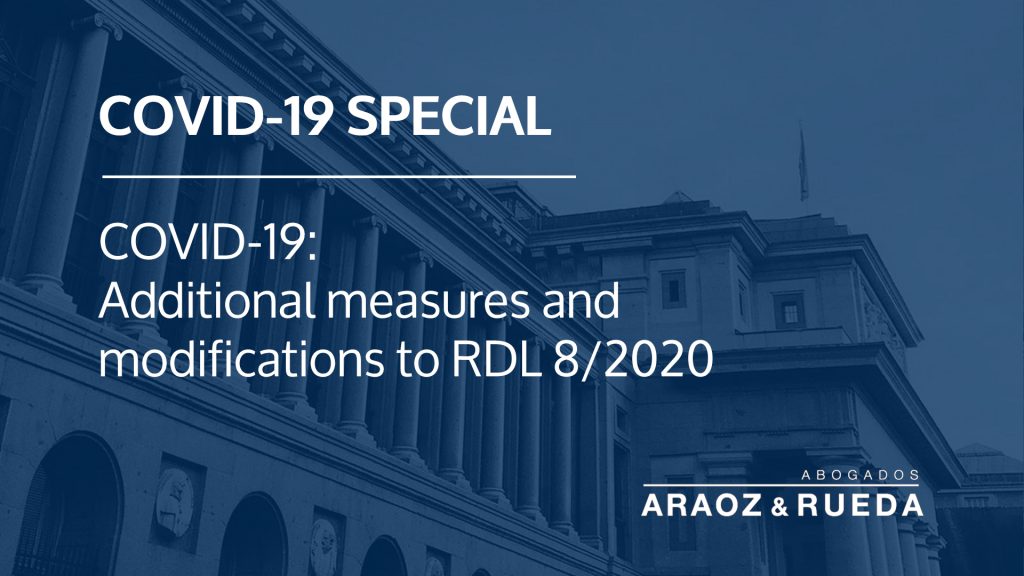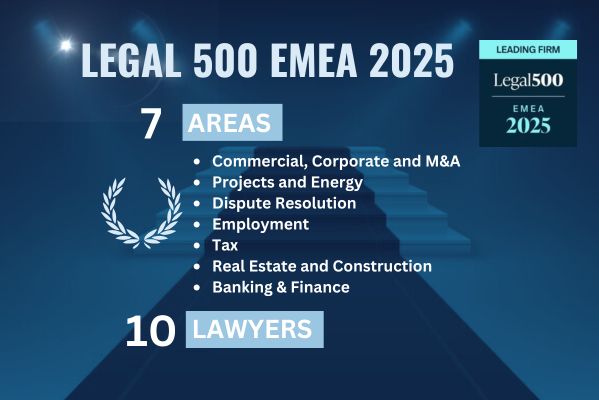1. Introduction
On 30 January 2020 the World Health Organization (WHO) declared that COVID-19 involved a public health emergency of international importance. As a result of this crisis being increased, Spain, among other states, has taken certain measures restricting the freedom of movement of their citizens, limiting or restricting the entry of travellers from countries with outbreaks of COVID-19, and adopting various types of provisions, in order to protect the health of citizens and mitigate, as far as possible, the economic consequences of this situation. Further, on 11 March, WHO confirmed that the COVID-19 outbreak had become a pandemic.
On Saturday 14 March 2020, the declaration of the state of alarm was published in the Spanish Official Gazette as a response to the public health crisis caused by COVID-19.
This situation has been addressed in Spain with the approval of, among others:
-
- the Royal Decree 463/2020 of 14 March, which declared a state of alarm for the management of the health crisis caused by COVID-19 (the “RD 463/2020”);
- the Royal Decree-Law 8/2020 of 17 March, on urgent extraordinary measures to deal with the economic and social impact of COVID-19 (“RDL 8/2020”);
- the Royal Decree 476/2020 of 27 March, extending the state of alert declared by RD 463/2020 of 14 March, which declares the state of alert for the management of the health crisis situation caused by COVID-19 (the “RD 476/2020”);
- the Royal Decree-Law 9/2020 of 27 March, which adopts complementary measures in the field of employment to mitigate the effects of COVID-19 (RDL 9/2020);
- the Royal Decree Law 10/2020 of 29 March, regulating recoverable paid leave for employees who do not provide essential services, in order to reduce population mobility in the context of the fight against COVID-19 (RDL 10/2020); and
- the Royal Decree-Law 11/2020 of 31 March, which adopts additional urgent measures in the social and economic sphere to address COVID-19 (RDL 11/2020), which we analyze in this note.
According to the Explanatory Memorandum of RDL 11/2020, its publication pursues two main objectives:
-
- the adoption of a new package of social measures aimed at supporting workers, consumers, families and vulnerable groups, with emphasis on those most in need.
- the implementation of a range of measures with a direct impact on strengthening economic activity, as well as actions aimed at supporting businesses and self-employed.
The complementary measures referred to in RDL 11/2020 can be divided into three series of measures:
- The first of these consists on measures to support workers, families, consumers, the self-employed and the most vulnerable groups.
- The second series is made up of initiatives that seek to sustain the industrial fabric and employment, and to facilitate the future recovery of the activity.
- Finally, the third series gathers those measures adopted to increase flexibility in various administrative activities and processes.
In addition to the foregoing, some of the measures adopted through RDL 8/2020 have been reinforced or modified with RDL 11/2020.
Unless otherwise expressly stipulated, the measures provided for in RDL 11/2020 will be in force until one month after the end of the declaration of the state of alarm (i.e. until 12 May 2020), unless a royal decree law agrees an extension.
2. Corporate
In accordance with paragraphs thirteen and fourteen of the First Final Provision of RDL 11/2020, some of the measures that were adopted by RDL 8/2020 have been modified (in particular, Articles 40 and 41).
1. Managing body
- It is stated that the meetings of the managing body and other committees may be held by videoconference or by multiple telephone conference, provided that all the members of the body have the necessary means and the secretary of the body acknowledges their identity and states so in the minutes.
2. Drawing up and approval of the annual accounts
- The drawing up of the annual accounts by the managing or administrative body of a legal entity during the state of alarm will be considered valid, without prejudice to the possibility of benefiting from the extension provided for in RDL 8/2020.
- The two-month extension of the period for the verification of the annual accounts already prepared will apply, with the new wording, both for those companies subject to mandatory audit and for those subject to voluntary audit.
3. Proposed application of the result
- The companies that had drawn up their annual accounts may call an ordinary general meeting as from the entry into force of RDL 11/2020, in which they may replace the proposed application of the result contained in the report with another proposal.
- However, the managing body must justify that the replacement of the proposal for the application of the result is given by the consequences of COVID-19 and, in addition, it must be accompanied by a letter from the auditor stating that he would not have changed his audit opinion if he had known about the new proposal when he signed it.
4. Applicable measures to listed companies
RDL 8/2020 (in its Article 41) adopted certain exceptional measures applicable to companies with securities admitted to trading on a regulated market in the EU. With respect to these measures, RDL 11/2020 specifies that:
- When listed companies apply any of the measures contained in Article 40.6 bis of RDL 8/2020, the new proposal, its justification by the managing body and the auditor’s statement must be made public, as soon as they are approved, as supplementary information to the annual accounts on the company’s website and on the website of the CNMV as other relevant information or as privileged information, if required.
3. Banking and Finance
1. The mortgage moratorium
Article 16 of RDL 11/2020 establishes certain clarifications on the definition of economic vulnerability to the effects of the mortgage moratorium and non-mortgage financing credit, with respect to the definition already provided in RDL 8/2020. In particular, the criteria for assessing economic vulnerability that have been modified are as follows:
- That the potential beneficiary becomes unemployed or, in the case of employers or professionals, suffers a substantial loss of income or a substantial drop in turnover (at least 40%).
In this sense, RDL 8/2020 referred to “sales” and not “turnover”.
- That the total income of the members of the family unit does not exceed, in the month prior to the application for the moratorium, a multiple of the Public Multiple Effect Income Indicator (IPREM) and adjusted according to certain particular cases.
- That the total of the mortgage payments for the real estate referred to in Article 19 (to which we will refer later), plus basic expenses and supplies is greater than or equal to 35 % of the net income received by all the members of the family unit.
In the wording given by RDL 8/2020, reference was made to “the mortgage payment”; the new wording provides for the possibility of the mortgage moratorium on several payments. It also establishes a definition of what are considered basic supplies for these purposes.
- That, as a result of the health emergency, the family unit has suffered a significant alteration in its economic circumstances in terms of efforts to access housing. The significant alteration will be considered to have taken place when the total of the mortgage charge, understood as the sum of the mortgage payments of the real estate referred to in Article 19 on the family income has been multiplied by at least 1.3.
- Notwithstanding the above criteria, Article 18 RDL 11/2020 establishes certain specialties for credit agreements without a mortgage guarantee in relation to the criteria established to determine a situation of economic vulnerability.
In addition, Article 19 of RDL 11/2020 establishes that the mortgage debt or loans referred to in Articles 7 to 16 ter of RDL 8/2020 will be those contracted for the acquisition of, in addition to the habitual residence:
- Properties affected by the economic activity developed by entrepreneurs and professionals who suffer a substantial loss of income or a substantial drop in turnover of at least 40%.
- Dwellings other than the usual one in a rental situation and for which the mortgage debtor, individual, owner and lessor of said dwellings, has ceased to receive the rental income since the entry into force of the state of alarm decreed by Royal Decree 463/2020, of 14 March, or ceases to receive it until one month after the end of the same.
2. Suspension of obligations arising from non-mortgage credit agreements
- Articles 21 et seq. of RDL 11/2020 establish the measures and procedures for the temporary suspension of contractual obligations arising from any loan or credit without a mortgage guarantee, provided that the credit was contracted by an individual in a situation of economic vulnerability, in accordance with the abovementioned criteria and provided for in RDL 8/2020 and RDL 11/2020.
- These measures will also be applicable to the principal debtor’s guarantors and guarantors in the same circumstances, who may also require the creditor to exhaust the principal debtor’s assets before claiming the guaranteed debt from them (Article 42 of RDL 11/2020).
- Thus, in accordance with the provisions of Article 23 of RDL 11/2020, debtors who are in a situation of economic vulnerability may request from their creditor the suspension of the obligations derived from the credit agreements without mortgage guarantee.
- Once the request for suspension has been made, and provided that the situation of economic vulnerability has been proven, the creditor must proceed to the automatic suspension of the obligations arising from such credits.
- Notwithstanding the consequences of the debtor’s fraudulent behavior, as provided for in Article 26 of RDL 11/2020, Article 25 refers to the effects of the suspension, which are:
-
- The creditor may not demand payment of the instalment, or of any of the items that integrate it (amortization of the capital or payment of interest), either in full or in part.
- No interest of any kind shall be due, neither ordinary, nor moratorium.
- The expiry date of the contract will be extended for the duration of the suspension.
- When the lender and the borrower benefiting from the moratorium agree on a novation, as a consequence of the modification of the contract’s clauses in aspects other than the suspension referred to in Article 13 of RDL 8/2020, the suspension of the contractual obligations must be included, as well as the non-accrual of interest during the validity of the suspension.
- The deadline for this request will be up to one month after the end of the state of alarm, i.e. 12 May 2020, without prejudice to any extensions of the state of alarm that may be agreed.
- The term of the suspension shall be three months and may be extended by agreement of the Spanish Council of Ministers.
Finally, we must point out that, through paragraphs two to seven of the First Final Provision, a large part of the measures referred to in this paragraph are introduced into RDL 8/2020, through amendments to Articles 7 to 16.
4. Insolvency and bankruptcy
The Fourth Transitional Provision of RDL 11/2020 contains two references to the measures already provided for in RDL 8/2020. In particular:
- It is established that, on the date of entry into force of RDL 11/2020, should a court order had been issued by the judge of the bankruptcy proceeding ruling the application of the measures provided for in RDL 8/2020, the court decision will have full effect for the recognition of the benefits provided for in the RDL 11/2020.
- Applications in which no decision has been made by the bankruptcy proceeding judge must be sent to the labor authority and will be processed according to the procedure and with the stipulations provided for in Articles 22 and 23 of RDL 8/2020.
Furthermore, paragraph sixteen of the First Additional Provision of RDL 11/2020 introduces the Tenth Additional Provision (“Stipulations in application of Chapter II to the companies in bankruptcy proceedings”) of RDL 8/2020, so that the companies in bankruptcy proceedings may have access to the measures in order to relax the mechanisms of temporary adjustment of activity to avoid dismissals, provided that they meet the requirements established in the same RDL 11/2020.
5. Restrictions on foreign investment
The Third Final Provision of RDL 11/2020 modifies the foreign investment regime (Spanish Law 19/2003), previously modified by RDL 8/2020, suspending the liberalization of certain foreign direct investments in Spain.
In particular, this amendment extends the scope of the suspension of the regime of liberalization of certain foreign direct investments in Spain in the main strategic sectors, so that it is also extended to those made by investors resident in the European Union and the European Free Trade Association countries, when such investors are controlled by entities resident outside those areas.
In accordance with the new wording of Article 7.1.bis of Spanish Law 19/2003, foreign direct investments in Spain will be considered to be all those investments as a result of which the investor holds a stake equal to or greater than 10 percent of the share capital of the Spanish company, or when as a result of the corporate operation, act or legal business, the investor effectively participates in the management or control of said company, provided that one of these circumstances occurs:¡
- That are carried out by residents of countries outside the European Union and the European Free Trade Association.
- That are carried out by residents of European Union or European Free Trade Association countries whose real ownership corresponds to residents of countries outside the European Union and the European Free Trade Association. It will be understood that such real ownership exists if the latter own or ultimately control, directly or indirectly, a percentage of more than 25% of the capital or voting rights of the investor, or when by other means they exercise control, directly or indirectly, over the investor.
In addition, the Second Transitional Provision of RDL 11/2020 introduces amendments to Law 19/2003, in order to streamline the procedure for processing and resolving certain requests for prior authorization of foreign investments, introducing a transitional procedural regime for operations already in progress when the new Article 7 bis of Law 19/2003 came into force and for those amounting to between 1 and 5 million euros, exempting from the need for prior authorization operations of less than 1 million euros.
6. Real Estate
- RDL 11/2020 (Articles 3 to 9) establishes the measures leading to a moratorium on rental debt for tenants of permanent housing in a situation of economic vulnerability – under the terms of the decree itself – as a result of COVID-19.
- Article 4 of RDL 11/2020 provides for the automatic application of the moratorium on rental debt in the case of large holders and public housing companies or entities, on rental contracts subject to the 1994 Spanish Urban Leases Act.
- Provided that the parties have not voluntarily agreed to the total or partial postponement or forgiveness of rent, the tenant may request the landlord to temporarily and extraordinarily defer payment of the rent, provided that the landlord is a public housing company or entity or a large holder, within one month of the entry into force of RDL 11/2020.
- For these purposes, in accordance with said Article 4 of RDL 11/2020, a large dwelling is understood to be an individual or legal entity that owns more than ten urban properties, excluding garages and storage rooms, or a constructed area of more than 1,500 square meters.
- In the event that the voluntary agreement referred to above has not been reached, the lessor must inform the lessee within 7 working days of one of the following alternatives:
-
- A 50% reduction in rent for the duration of the state of alarm and the following monthly payments, with a maximum of four months.
- A moratorium on the payment of rent that will be applied automatically and that will affect the period that the state of alarm lasts, up to a maximum of four months. Said rent will be deferred, as of the next monthly rental payment, by means of the instalment of the quotas for at least three years, counting from the moment in which the aforementioned situation is overcome, or from the end of the aforementioned four-month period.
In this case, the tenant will not have any kind of penalty and the deferred amounts will be returned to the landlord without interests.
- Article 5.1 of RDL 11/2020 establishes the criteria for determining when the debtor is in a situation of vulnerability, which must be proven in accordance with the criteria established in Article 6 of the same Royal Decree-Law:
-
- That the person who is obliged to pay the rental income becomes unemployed, Temporary Employment Regulation File (ERTE), or has reduced his or her working hours due to care, in the case of an employer, or other similar circumstances involving a substantial loss of income.
- That the total income of the members of the family unit does not exceed, in the month prior to the application of the moratorium, a certain multiple of the monthly Public Multiple Effect Income Indicator (IPREM), determined in RDL 11/2020, depending on certain circumstances of the family unit.
- That the mortgage fee, plus basic expenses and supplies, is greater than or equal to 35 percent of the net income received by all members of the family unit.
- That, as a result of the health emergency, the family unit has suffered a significant alteration in its economic circumstances in terms of efforts to access housing, in accordance with the terms of RDL 8/2020.
Debtors who can benefit from the moratorium in accordance with the provisions of the previous sections may request it from their creditor entity until one month after the entry into force of RDL 11/2020.
Those who benefit from the measures without fulfilling the requirements, in accordance with Article 7 of RDL 11/2020, will be responsible for the damages produced and the expenses generated, without prejudice to other responsibilities of different nature.
Likewise, tenants of permanent housing contracts signed under 1994 Spanish Urban Leases Act who are in a situation of economic vulnerability, as defined in Article 5, may apply to the lessor, when the latter is not one of those included in Article 4 (companies, large holders or public entities), within one month of the entry into force of RDL 11/2020, the temporary and extraordinary postponement of the payment of the rent, provided that such postponement or the total or partial remission of the rent had not been previously agreed upon by both parties on a voluntary basis. The lessor must reply within 7 working days to the conditions of the postponement or instalment that he accepts or propose other alternatives. If no agreement is reached and the lessor is in a situation of vulnerability as set out in RDL 11/2020, he may have access to the transitional financing aid program provided for in Article 9 of RDL 11/2020.





